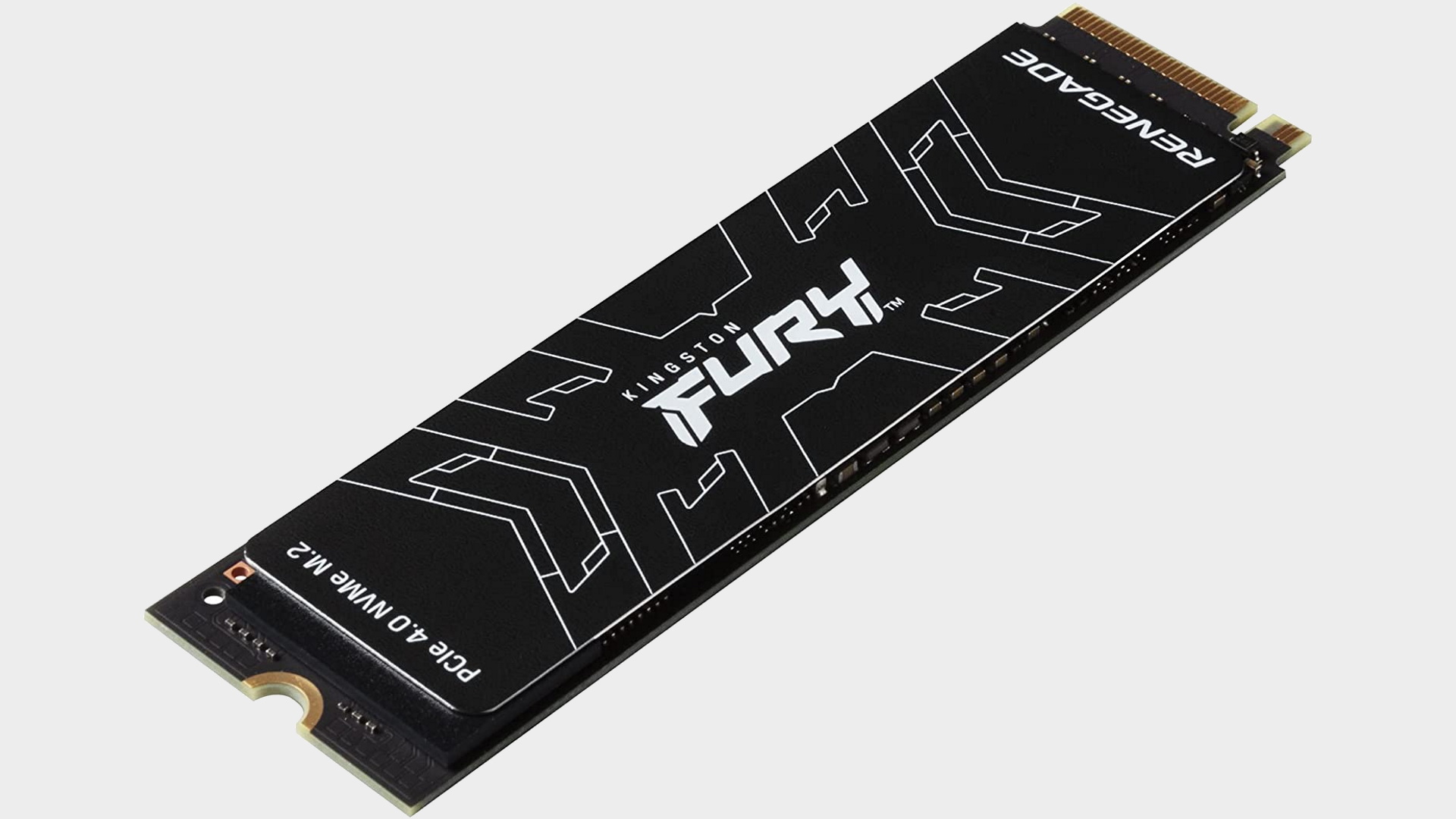Our Verdict
Kingston’s new high-performance M.2 SSD certainly cranks out the numbers. It also runs cool, has excellent rated write endurance, and a long warranty. But all that good stuff comes at a painful price.
For
- Killer PCIe 4.0 performance
- Excellent write endurance
- Low operating temps
Against
- Painfully pricey
- 4K performance merely competitive
PC Gamer's got your back
Another day, another stupid-fast PCIe Gen 4 SSD based on the popular Phison E18 controller chip? More or less, yes. In fact, the new Kingston Fury Renegade SSD, reviewed here in 2TB configuration, isn’t even unique within Kingston’s range of M.2 drives. The closely related Kingston KC3000 also sports the E18 controller.
Other Phison E18-based drives that have landed in PC Gamer’s labs include the Sabrent Rocket 4.0 Plus, the PNY XLR8 CS3140, and the Addlink S95. No question, we’re familiar with the appeal of the E18 controller.
As we’ve detailed before, Phison's PS5018-E18 is an eight-channel controller knocked out on none other than TSMC’s 12nm process. It’s loaded with five CPU cores in total, three based on generic ARM Cortex R5 IP and two cores with proprietary Phison designs. Phison claims the E18 can crank out 7.4GB/s read and 7GB/s write speeds, not to mention one million IOPS. We’ve previously seen the E18 classified as an NVMe 1.4 chip, but Kingston claims NVMe 2.0 support for the Fury Renegade.
As for the specifications of the NAND memory chips Kingston has chosen, it only quotes 3D TLC NAND. However, courtesy of some routine sleuthing, we believe Kingston is using the same Micron 176-Layer 3D TLC chips as seen in the KC3000 sibling drive. All of which means you’re looking at a thoroughly up-to-date drive. Obviously, the PCIe 5.0 standard is notionally upon us with the arrival of Intel’s Alder Lake CPUs. But we’re some way from PCIe 5.0 drives and platforms being mainstream and compatible drives being available in volume, although Phison is already on the ball with its PCIe 5.0 controller testing.
As for further details, this 2TB drive is quoted at 7,300MB/s for sequential reads and 7,000MB/s for writes, while random access performance is pegged at 1,000,000 IOPS in both directions. Meaty numbers all around, to be sure.
Physically, this M.2 2280 format drive benefits from a thin aluminium heat spreader augmented by a thin layer of graphene for optimised thermal conductivity. As for how this Fury Renegade drive differs from its KC3000 sibling, we’re talking detail differences. The Fury Renegade is claimed to be marginally faster, while the KC3000 models have slightly more usable space at any given capacity.
However, the smaller capacity allows for more redundancy provision on the Fury and in turn better write endurance. Where the 2TB KC3000 is rated at 1,600TB of write endurance, the 2TB Fury Renegade gets a 2,000TB rating. In reality, very few users are going to flirt with 1,600TB of writes, let alone 2,000TB.
Anywho, what do we make of the Kingston Fury Renegade from our actual testing? During the warm-up phase before our formal testing kicks off, which involves filling the drive with data, this SSD makes a very strong impression. The internal file copy speed zips along at 1.8GB/s and it sustains that performance for fully 700GB before dropping down to around 1GB/s for the remainder of the fill.
By way of comparison, the PNY XLR8 is a fraction slower at a peak of 1.7GB/s, only sustains that for 300GB, and then drops precipitously to a range between 400MB/s and 800MB/s, albeit that drive was tested in 1TB, not 2TB config. For the record, the 2TB Sabrent rocket 4 Plus delivers similar sustained performance as the Fury Renegade.
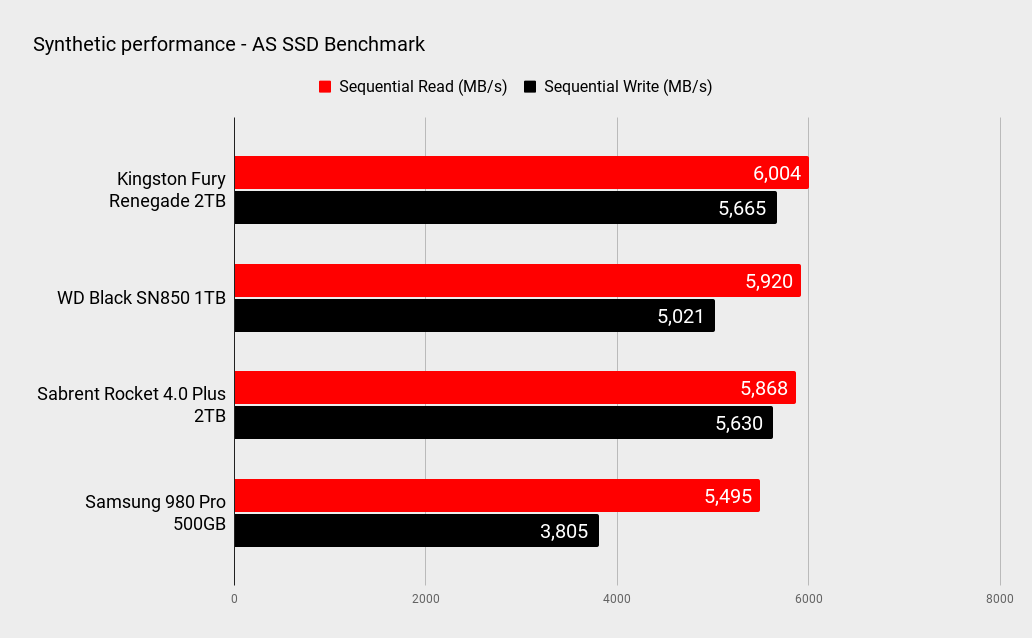
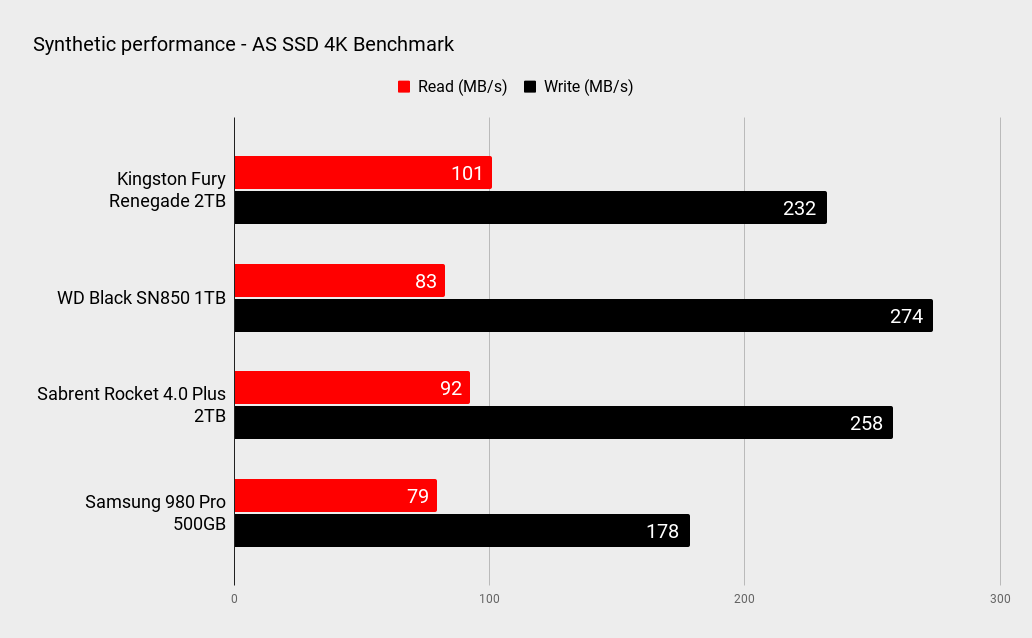
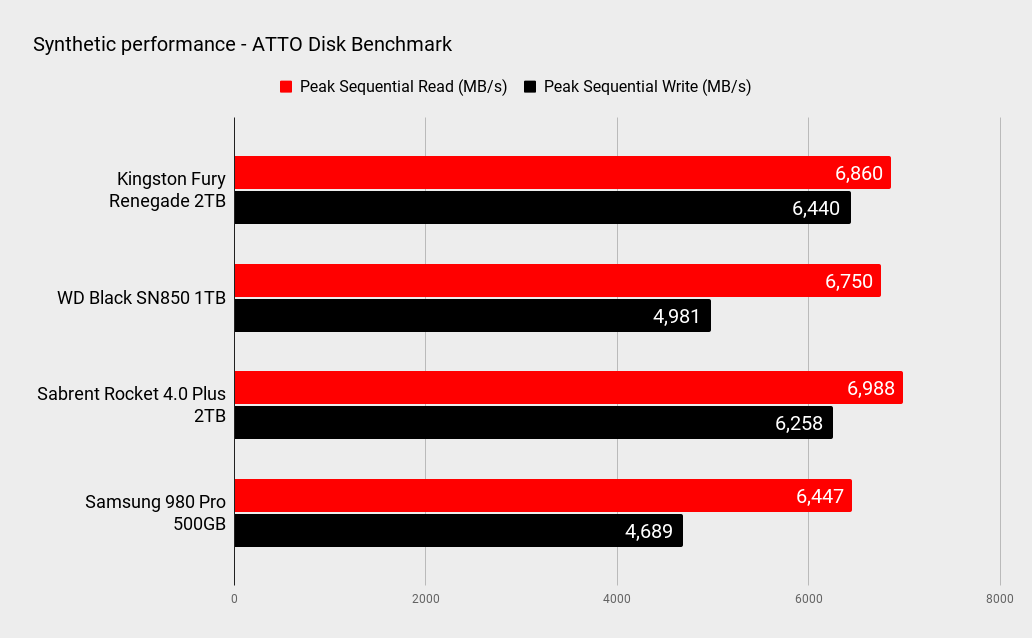
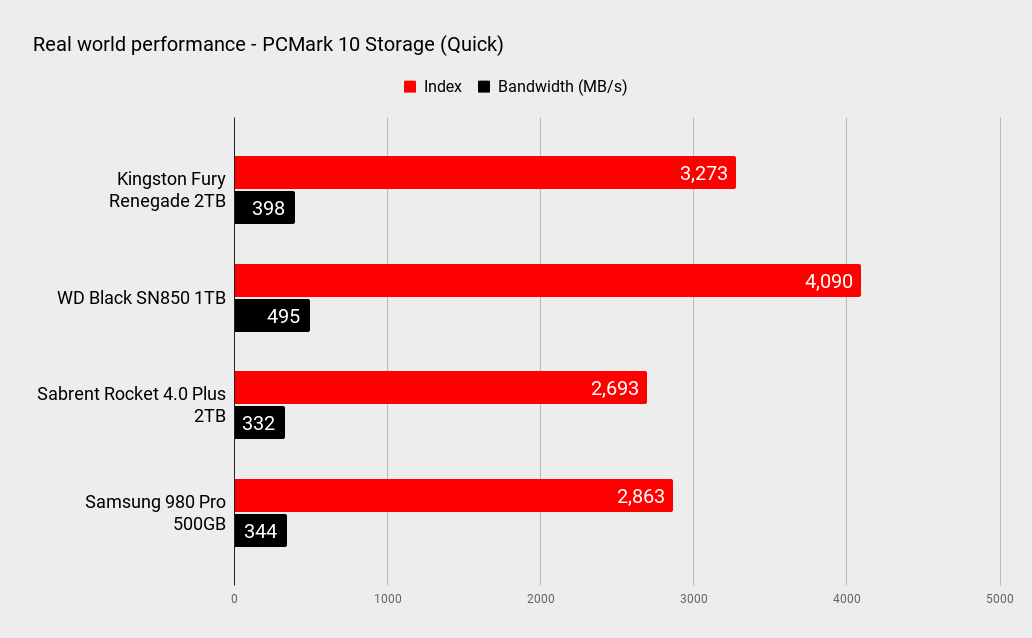
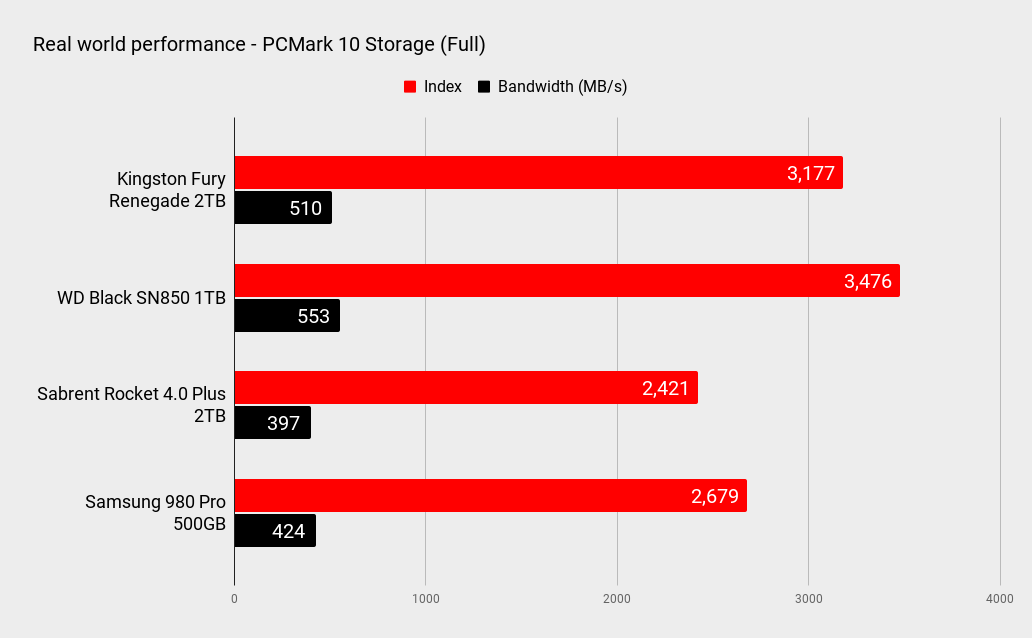
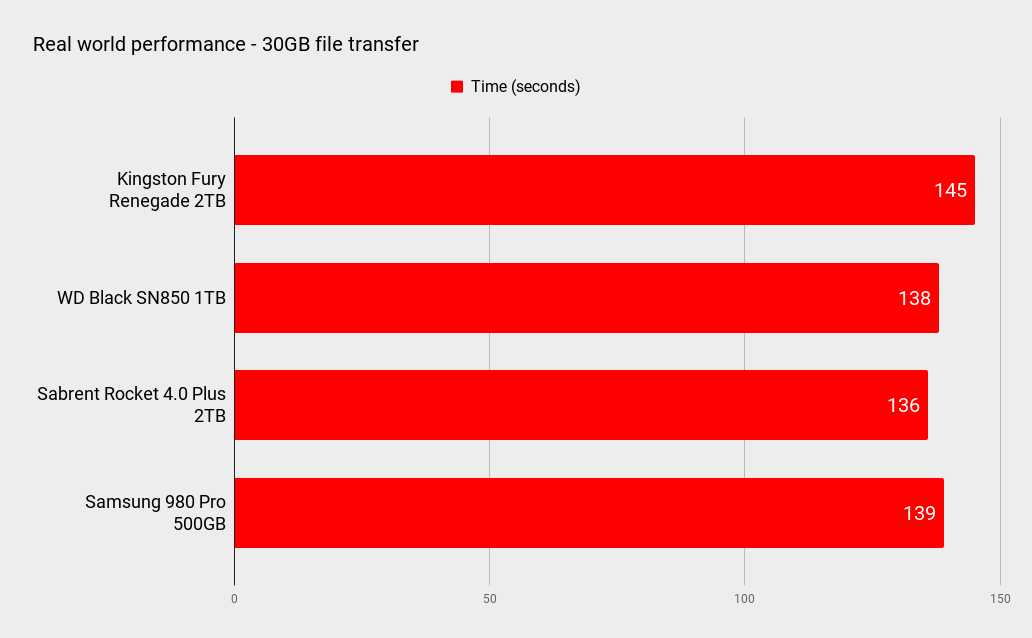
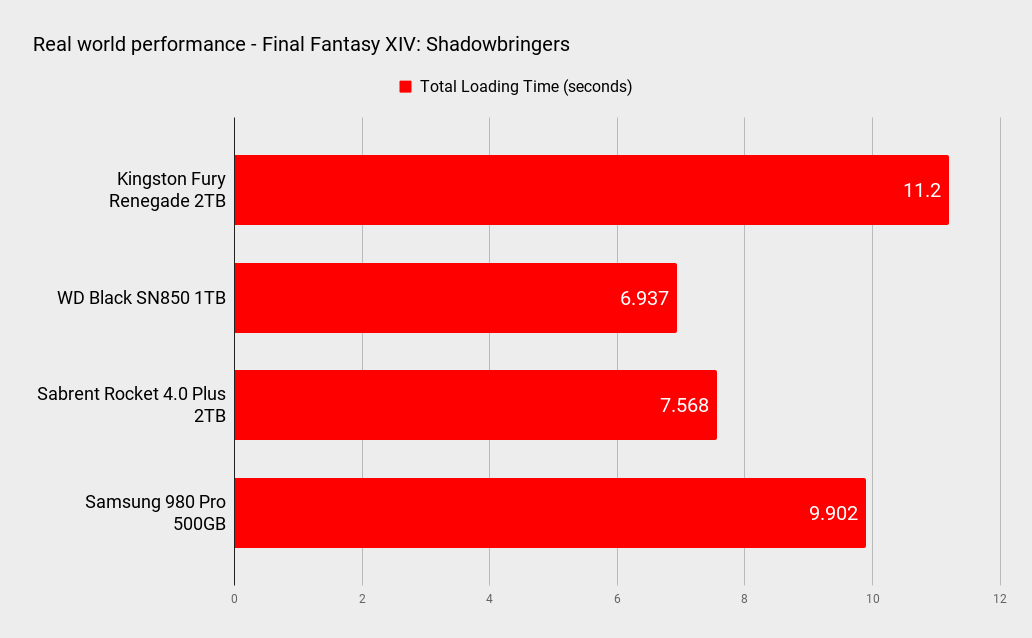
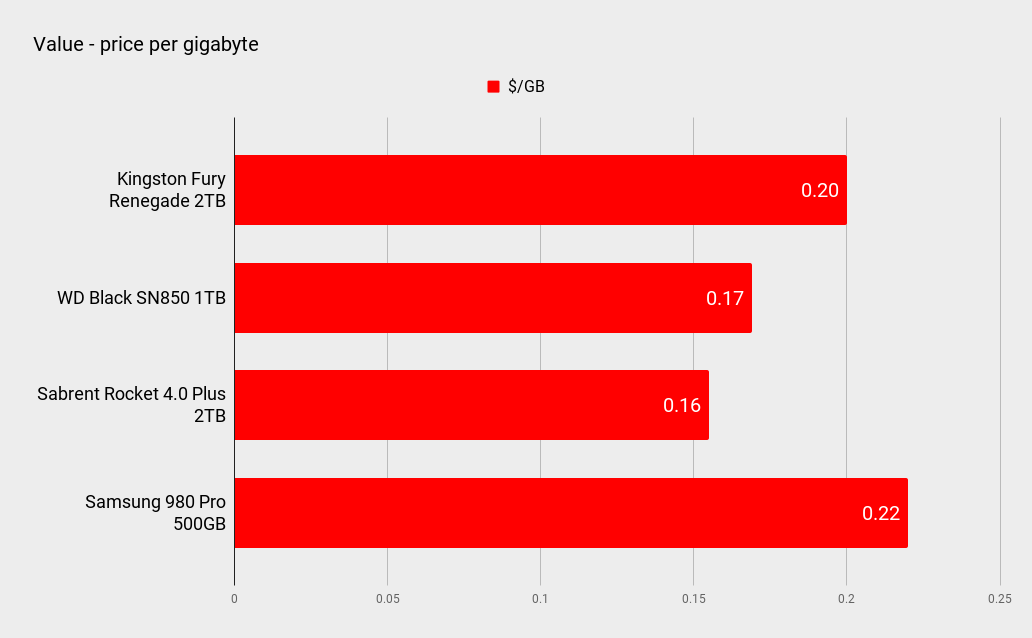
Jumping into the formal benchmark suite, it’s not a trivial task to separate this Phison E18-based protagonist from the similarly-equipped competition. Peak sequential speeds are awash in ATTO, for instance, certain if you compare like-for-like with 2TB models. The Kingston Fury Renegade does carve out a bit of a niche in CrystalDiskMark. But can you really tell the difference, in the real world, between 7,000MB/s and 7,300MB/s? Probably not.
In 4K random access tests across multiple applications the Fury tends to be slightly ahead for reads and slightly behind for writes. One area where it scored particularly well versus the Phison competition was in PCMark’s full drive test, nailing 3,177 points where the competition can’t even manage 2,500 points. That said, it’s worth remembering that the WD Black SN850, which isn’t in the Phison camp, cranks out nearly 3,500 points.
What’s more, like other Phison drives, this one runs nice and cool. A peak of 44 degrees C means that you’re unlikely to have to worry about thermal limitations throttling performance - or causing long-term reliability issues, for that matter.
Overall, then, this is a really quick drive. In terms of the subjective computing experience, we doubt you’d be able to pick it from the rest of the high-performance PCIe Gen 4 crop. Which means the broader package and pricing are key differentiators. We feel good about this drive’s long-term reliability thanks to those cool running temps and epic write endurance rating.
The value for money proposition is a lot less appealing. This is currently one of the most expensive PCIe Gen 4 drives out there right now, rolling in at $425 at the time of review. The Sabrent Rocket 4 Plus, WD Black SN850, and Samsung 980 Pro can all be had for considerably less money. So, as undeniably good as this is, we find the Kingston Fury Renegade a little tough to justify at this lofty price point.
Kingston’s new high-performance M.2 SSD certainly cranks out the numbers. It also runs cool, has excellent rated write endurance, and a long warranty. But all that good stuff comes at a painful price.

Jeremy has been writing about technology and PCs since the 90nm Netburst era (Google it!) and enjoys nothing more than a serious dissertation on the finer points of monitor input lag and overshoot followed by a forensic examination of advanced lithography. Or maybe he just likes machines that go “ping!” He also has a thing for tennis and cars.
